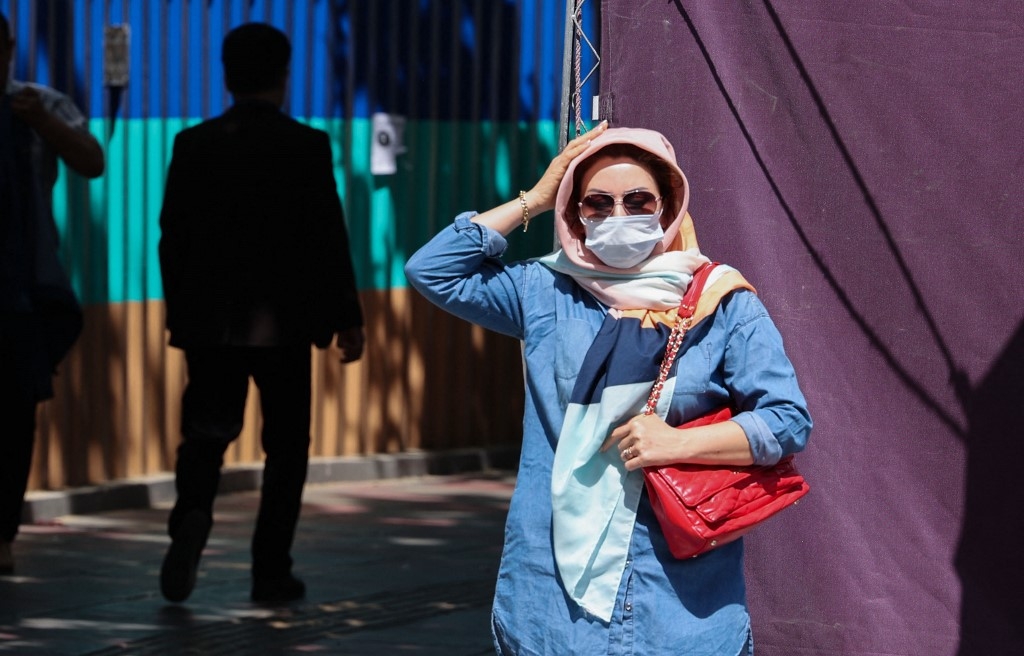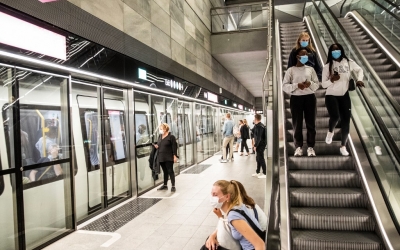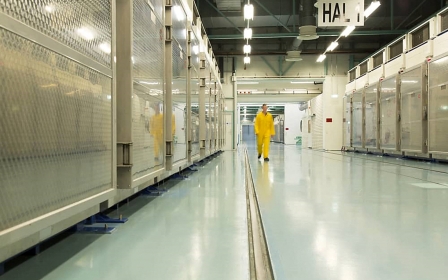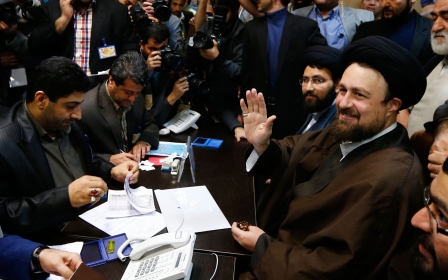Iranian press review: Who caused Iran's fourth Covid-19 wave?

Fourth wave prompts criticism of government and US sanctions
As Iran battles a devastating fourth wave of Covid-19, President Hassan Rouhani's administration has been blamed for mismanagement and its indecision over imposing a national lockdown in the worst-hit country in the region by the coronavirus.
On Saturday, after weeks of warnings from the health ministry about the urgency of banning travel during the Nowruz holidays, Rouhani's government imposed a 10-day lockdown on Tehran and all 30 provincial capitals in the country.
However, health professionals said that the government's move was very late and insufficient.
'Everyone, even the most illiterate and uninformed people, knew that with the government's choice not to ban travels in Nowruz, we would end up in this situation'
- Jam e-Jam daily
After a two-week holiday for Nowruz, the coronavirus death toll in Iran surpassed 250 every day, with experts warning that the numbers will soon reach 600 deaths a day.
Following the sharp rise in the number of deaths in the country, the Jam-e Jam daily accused Rouhani's administration of "imprudence".
"It was crystal clear that we would get to this point," a report by the paper read.
"Everyone, even the most illiterate and uninformed people, knew that with the government's choice not to ban travels in Nowruz, we would end up in this situation," the daily added.
Despite a closure order of all non-essential workplaces, parks, sports clubs and a night curfew, many shops remained open in the capital Tehran and citizens freely go to parks and travel to Turkey, another epicentre of the virus in the region.
Following ordinary Iranians' negligence of official orders to control the pandemic's spread, sociologists have suggested that Iranian society suffers a declining social trust.
"People will not cooperate or follow protocols unless they have high trust in official and governmental offices," Iranian academic Hadi Khaniki told the state-run Iran daily.
"Having low social capital is one of our worst issues. When social capital is low in a society, citizens will not trust the government and decisions made by them," he added.
Meanwhile, the Iranian foreign minister's advisor Gholamreza Ansari, who negotiated with other countries to import the Covid-19 vaccine, told the Hamshahri daily that Iran was unable to import vaccines due to Washington's restrictions on Tehran transferring money to vaccine exporters.
"We had direct talks with Japan and South Korea to use our money in those countries to buy the vaccine, but they said that the US does not permit them," Ansary said.
"We would be among the countries with the highest percentage of vaccination if we had not faced the sanctions. Our main issue with importing vaccines is the US inhumane sanctions. They have blocked all possible ways for us to pay the money for the vaccines," he added.
Minister under fire over 2019 protest killings
Iranian legislator Ahmad Alireza Beigi has accused Interior Minister Abdolreza Rahmani Fazli of being responsible for the death of hundreds of citizens in the November 2019 riots, which took place across the country after a sudden tripling of fuel prices.
"The interior minister's hands are stained with the blood of people, and he is not qualified for his position," Beigi said in a parliamentary speech, widely reported on local media amid renewed political clashes over the killing of civilians during the 2019 unrests.
'The interior minister's hands are stained with the blood of people, and he is not qualified for his position'
- Ahmad Alireza Beigi, Iranian MP
Beigi also urged the parliament's executive board to process an impeachment petition against the interior minister.
In response to Beigi's speech, Iran's interior ministry rejected his claims, saying those killed in November 2019 were "thugs".
"In November [2019], groups of thugs were organised by foreigners to divert people's protests," said Mohammad Javad Kolivand, a deputy interior minister.
Kolivand added that his ministry would sue Beigi for his claims, a move that was welcomed by Beigi.
"I welcome the interior minister's complaint, as previously Zangeneh, Nobakht, Akhoundi and Pouri Hosseini have also filed complaints against me," Beigi wrote on Twitter, referring to other ministers and deputies in Hassan Rouhani's government.
"Hopefully, with Mr Rahamni Fazli's complaint, people will get a chance to know the bitter truth of what happened in November 2019," he added.
It is not the first time that Rahmani Fazli has come under fire over the 2019 unrests. However, his close ties with the office of Iran's supreme leader and Iran's Islamic Revolutionary Guard Corps (IRGC) have so far saved him from six impeachment attempts.
According to Amnesty International, 304 people were killed during the unrests that swept all Iranian cities in November 2019. Last year, Rahmani Fazli said that between 200 and 220 persons died in the 2019 protests.
Supreme leader bans lengthy talks with the West
Iran's supreme leader, Ayatollah Ali Khamenei, who has the final say on Iran's nuclear programme and negotiations with world powers, ordered officials on Tuesday to avoid any prolonged talks with the remaining signatories to the 2015 nuclear accord.
"Officials believe it is better to negotiate [to return to the nuclear deal], and I have no disagreement with that, but they must be careful not to engage in exhaustive negotiations because that is deconstructive for the country," he was quoted as saying by local media.
"American proposals [regarding the nuclear deal] are mostly arrogant and contemptuous, not worth to even have a look at those," he added, referring to the US proposal to return to the 2015 nuclear deal with Iran.
Joe Biden's administration had proposed partially removing the US sanctions imposed on Iran after Washington's unilateral withdrawal from the nuclear deal in 2018, in exchange for Iran's full compliance with its commitment according to the agreement.
Iran has rejected the Washington proposal urging Biden to first meet the US nuclear deal commitment and remove all sanctions imposed on Iran by former president Donald Trump.
In Tuesday's speech, Iran's supreme leader claimed that European countries in private meetings agree that Iran's demands are logical, adding: "However when it is time to make a decision Europeans have no independence, and they are all surrendered to what Americans say."
* Iranian press review is a digest of reports that are not independently verified as accurate by Middle East Eye.
Middle East Eye propose une couverture et une analyse indépendantes et incomparables du Moyen-Orient, de l’Afrique du Nord et d’autres régions du monde. Pour en savoir plus sur la reprise de ce contenu et les frais qui s’appliquent, veuillez remplir ce formulaire [en anglais]. Pour en savoir plus sur MEE, cliquez ici [en anglais].





